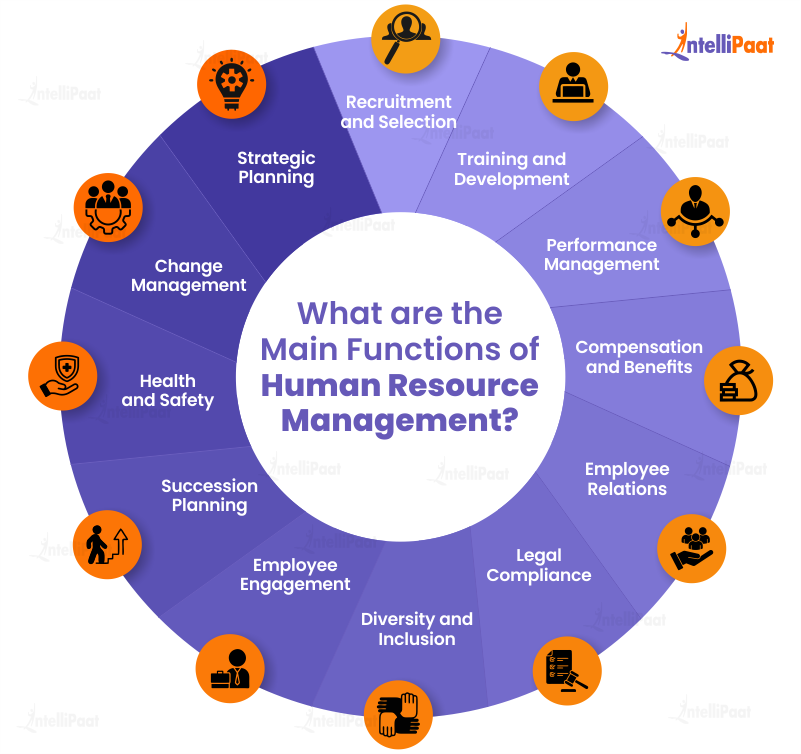What is Human Resource Management? Working, Functions, & Benefits
HRM plays a crucial component in any type of organization, as it helps the organization become more competitive and grow at a faster pace. In this blog, we delve into the world of HRM, exploring its significance, key functions, challenges, and evolving trends.
Let’s explore the following topics to have a better understanding of HRM:
- What is Human Resource Management?
- Why Do We Need Human Resource Management?
- How Does Human Resource Management Work?
- What are the Main Functions of Human Resource Management?
- Objectives of Human Resource Management
- Prerequisites for Human Resource Management
- Skills and Responsibilities Required for Human Resource Management
- Benefits of Human Resource Management
- Challenges in Human Resource Management
- Examples of HRM Software
- Human Resource Management Careers
- Conclusion
What is Human Resource Management?
Human resource management (HRM) involves managing employees to achieve an organization’s goals. It involves a variety of duties and methods for managing hiring, education, reviewing, and compensating staff members. It looks into their general well-being at work. HRM works as a bridge between an organization’s goals and its employees’ skills. It fosters a positive and effective work environment.
It comprises various components, including identifying and selecting the most suitable individuals for the team. It ensures that everyone receives the appropriate training and maintains a learning mindset as the company evolves. Furthermore, as employees carry out their tasks, HRM assesses their performance and supports their enhancement.
To learn more about general management, check out Intellipaat’s General Management course.
Why Do We Need Human Resource Management?
Human resource management is important for several reasons. Let’s explore these points to understand the necessity of HRM:

- Talent Acquisition: HRM helps businesses find and hire people suitable for particular positions. This guarantees that the staff has the knowledge and understanding to support the goals of the organization.
- Employee Development: HRM provides training and promotes the growth of employees to boost their skills and abilities. This leads to improved job performance, job satisfaction, and opportunities for career growth.
- Performance Management: It establishes clear expectations, provides feedback, and evaluates employee performance. This helps employees understand how their contributions align with company objectives. It provides a basis for recognition and improvement.
- Workplace Culture: The company’s culture and values are greatly influenced by HRM. Employee engagement, loyalty, and morale all grow in a favorable work environment.
- Conflict Resolution: Conflicts are natural in any workplace. HRM helps in mediating and resolving conflicts. It ensures a harmonious work environment where employees can collaborate.
How Does Human Resource Management Work?
Human resource management (HRM) acts as the backbone of an organization’s strategies. It operates through a set of practices designed to maximize the potential of a company’s workforce. HRM starts by identifying the right candidates for open positions. Through recruitment and selection processes, candidates are shortlisted.
Once onboard, employees undergo continuous training processes and development programs. It enhances their skills and adapts to the evolving demands of the business landscape. The HRM manages performance evaluations. They set goals and offer feedback to help employees contribute to the company’s objectives.
In addition, HRM creates pay and benefits plans to attract and keep talented employees. It plays a major role in maintaining a harmonious workplace environment by addressing conflicts and fostering positive relationships.
HRM protects employees and the company by following laws and ethical standards. It promotes diversity, inclusion, and employee engagement to motivate and empower the workforce. HRM aligns its practices to support the organization’s goals, which drives sustained success.
What are the Main Functions of Human Resource Management?
Here are the main functions of human resource management (HRM) summarized in points:

- Recruitment and Selection: Identifies workforce needs, advertises job openings, interviews candidates, and selects suitable individuals for various roles.
- Training and Development: Designs and delivers training programs to enhance employee skills and knowledge, enabling them to excel in their roles.
- Performance Management: Sets performance expectations, evaluates job performance, and provides feedback to improve alignment with company goals.
- Compensation and Benefits: Determines fair compensation packages, including salaries, bonuses, and benefits like health care and retirement plans.
- Employee Relations: Cultivates positive workplace relationships, addresses conflicts, and fosters a harmonious work environment.
- Legal Compliance: Ensures adherence to labor laws and employment regulations and prevents discrimination or harassment.
- Diversity and Inclusion: Promotes diverse and inclusive workplace cultures to harness varied perspectives.
- Employee Engagement: Boosts morale through activities, recognition, and initiatives that enhance job satisfaction.
- Succession Planning: Identifies and nurtures future leaders within the organization.
- Health and Safety: Ensures employee well-being and enforces workplace safety measures.
- Change Management: Assists in handling transitions and organizational changes.
- Strategic Planning: Aligns HR practices with overall organizational goals for sustained growth and success.
Objectives of Human Resource Management
The objectives of human resource management (HRM) consist of a variety of dimensions, including:
- Social Objectives: HRM aims to contribute to society by promoting fair employment practices, ensuring equal opportunities, and fostering diversity and inclusion within the workplace. By adhering to ethical standards and addressing social responsibilities, HRM creates a positive impact beyond the organization.
- Organizational Objectives: HRM aligns its efforts with the organization’s strategic goals. It aims to enhance workforce efficiency, productivity, and innovation to ultimately contribute to the company’s growth, profitability, and sustainability.
- Functional Objectives: HRM functions as a critical support system for the entire organization. It puts efforts into providing effective talent acquisition, development, and management, ensuring that the right people are in the right roles at the right time.
- Personal Objectives: On an individual level, HRM aims to fulfill employees’ personal aspirations and needs. This includes providing opportunities for skill development, career advancement, and job satisfaction, thereby contributing to employee well-being and motivation.
HRM needs to consider social, human, and functional aspects alongside organizational goals. This helps in creating a successful workforce plan.
Prerequisites for Human Resource Management
This domain is one of the toughest courses in India. To make your path easy check the several prerequisites to excel in HRM:
- Communication Skills: Effective verbal and written communication abilities are crucial. It helps in conveying policies, instructions, and resolving conflicts.
- Understanding Organizational Behavior: Knowledge of psychology and sociology helps in comprehending employee behavior, motivation, and team dynamics.
- Educational Background: Obtaining an MBA in human resource management can provide a solid foundation for a career in this field.
- Labor Laws and Regulations: Familiarity with employment laws ensures compliance and fair treatment of employees. It reduces legal risks.
- Interpersonal and Conflict Resolution Abilities: HR professionals must navigate and resolve conflicts while maintaining positive employee relations.
- Problem-Solving and Decision-Making Skills: Analytical thinking and effective decision-making are vital for addressing HR challenges.
- Ethical and Confidentiality Awareness: HR managers handle sensitive data and must uphold ethical standards and confidentiality.
Skills and Responsibilities Required for Human Resource Management
In this section, we’ll explore the skills and duties of human resource management. This will improve your understanding of HRM.
Skills Required for Human Resource Management
Here are the skills required for human resource management:

- Communication Skills: Clear communication is important. It helps in conveying policies, resolving conflicts, and interacting with employees and stakeholders.
- Interpersonal Skills: Building relationships, understanding employee needs, and mediating conflicts demand strong interpersonal abilities.
- Problem-Solving Skills: Addressing diverse HR challenges requires effective problem-solving. It involves employee performance issues to organizational changes.
- Analytical Abilities: HR analytics and data interpretation help in making informed decisions on workforce optimization.
- Leadership and Teamwork: Leading HR teams and collaborating across departments cause leadership and teamwork skills.
- Time Management: Juggling many tasks requires efficient time management. It involves recruitment to employee development.
- HR Technology Proficiency: Using HR software is crucial for functions such as payroll processing, performance management, and data analysis.
Key Responsibilities of HR Manager in HRM
We have outlined several essential tasks within human resource management:
- Conflict Resolution: Solving disputes and maintaining a harmonious work atmosphere
- Health and Safety: Implementing safety policies, ensuring a healthy work environment, and managing wellness programs
- Recruitment and Selection: Identifying talent needs, sourcing candidates, conducting interviews, and making hiring decisions
- Performance Management: Developing and implementing processes to assess and enhance employee performance
- Compensation and Benefits: Managing employee compensation, benefits administration, and ensuring fairness
- HR Metrics and Analytics: Collecting and analyzing data to make informed decisions and improve HR strategies
Benefits of Human Resource Management
We have listed the benefits of human resource management:
- Efficient Processes: Streamlined HR processes increase operational efficiency.
- Organizational Culture: HRM shapes a positive and inclusive work culture.
- Leadership Development: It identifies and nurtures future leaders.
- Adaptive Flexibility: HRM adapts to changing workforces and industry trends.
- Data-Informed Decisions: HR analytics informs informed decision-making.
- Employee Growth: HRM supports training and development for growth.
Challenges in Human Resource Management
Below are the prevalent difficulties encountered within HRM:
- Talent Shortage: Difficulty in sourcing skilled candidates for specialized roles.
- Skill Gap Identification: Identifying skill deficiencies for targeted training is tough.
- Diversity and Inclusion: It is quite hard to ensure inclusivity across diverse workforces.
- Rapid Technological Changes: There are various challenges in adapting HR practices to evolving tech trends.
- Work-Life Balance: Not easy to balance work demands with employee well-being.
- Conflict Resolution: Addressing interpersonal disputes within teams is a complicated task for HR people.
Examples of HRM Software
Examples of HRM software employed in the domain of human resource management are as follows:
- Workday: A broad HR platform for the cloud that handles payroll, benefits, and workforce administration.
- SAP SuccessFactors: Offers modules for performance management, recruitment, onboarding, and learning.
- BambooHR: Oversees the tracking of applicants, time off requests, and HR reporting.
- Oracle HCM Cloud: Oracle HCM Cloud uses generative AI tools for HR processes, talent management, and workforce analytics.
- Zoho People: Manages HR tasks like attendance, leave, and employee self-service
Career Transition
Human Resource Management Careers
Here are some of the main careers within the field of human resource management (HRM):
HR Generalist: HR generalists handle a variety of HR tasks across the board. It includes recruitment, employee relations, benefits administration, performance management, and more. They are often the go-to resource for employees and managers on HR-related matters.
Recruiter: Recruiters are responsible for finding and hiring the best talent for an organization. They post job openings, screen resumes, conduct interviews, and collaborate with hiring managers.
Training and Development Specialist: These specialists create and implement training programs to enhance employees’ skills and knowledge. They identify training needs, design curriculum, and evaluate the effectiveness of training initiatives.
Human Resource Manager/Director: HR managers or directors lead HR departments and oversee HR operations. They create HR plans that match business goals, oversee employees, and ensure HR policies follow laws.
Talent Management Specialist: Talent management specialists find and keep the best employees in the company. They also help employees grow. They create career development plans, succession strategies, and talent acquisition programs.
HR Consultant: HR consultants offer specialized expertise to organizations on various HR matters. They may provide guidance on compliance, strategy, or specific projects.
Explore the top HR interview questions in 2023 with Intellipaat and ace your next interview to get your dream job!
Human Resource Management Salary
Here is a table of the average salaries for HR professionals in India and the USA:
| Position | India | USA |
| HR Generalist | ₹4.5 lakhs–₹10 lakhs per year | $30,000–$60,000 per year |
| Recruiter | ₹3.5 lakhs–₹8 lakhs per year | $25,000–$50,000 per year |
| Training and Development Specialist | ₹3.0 lakhs–₹7 lakhs per year | $20,000–$40,000 per year |
| Human Resource Manager/Director | ₹7 lakhs–₹15 lakhs per year | $40,000–$90,000 per year |
| Talent Management Specialist | ₹5 lakhs–₹10 lakhs per year | $30,000–$60,000 per year |
| HR Consultant | ₹6 lakhs–₹12 lakhs per year | $40,000–$70,000 per year |
Conclusion
Ultimately, human resource management not only ensures the effective functioning of an organization’s workforce but also drives its success through the efficient utilization and development of its human capital. As companies understand how important HRM is for getting ahead, the field keeps changing. This creates many exciting and fulfilling job chances for people who care about making the future workplace better.
For more information on General Management, visit our Community page.
The post What is Human Resource Management? Working, Functions, & Benefits appeared first on Intellipaat Blog.
Blog: Intellipaat - Blog
Leave a Comment
You must be logged in to post a comment.













